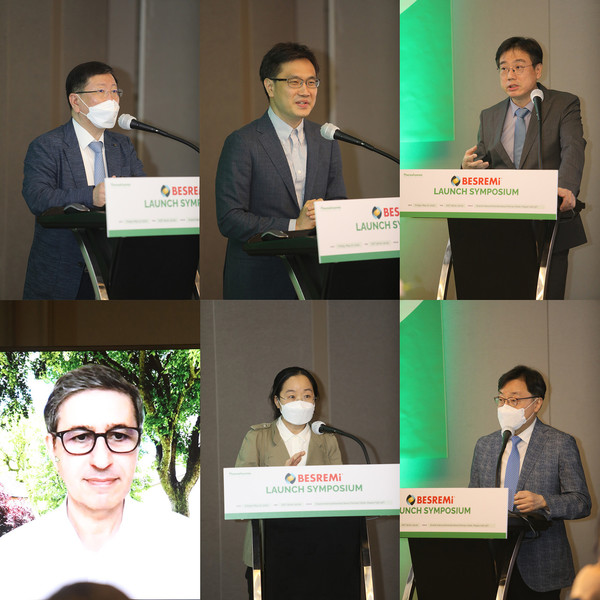PharmaEssentia’s Besremi (ropeginterferon alfa-2b-njft) could cure polycythemia vera (PV) fundamentally, the latest study results showed. Still, health experts said that Korean patients find it difficult to use it due to the lack of health insurance coverage.
PharmaEssentia Korea held a symposium on Friday to mark the release of Besremi, a treatment for PV, which is a type of blood cancer.

At the symposium, hematologists discussed the unmet needs of PV treatment, the latest knowledge, and major clinical studies of Besremi.
Professor Yoon Sung-soo of hemato-oncology at the Seoul National University Hospital spoke on the unmet medical needs for PV treatment.
PV patients have a short survival, and those aged 59 and younger have a higher mortality risk, Yoon noted.
“It is a serious disease that 10-15 percent of PV patients progress to myelofibrosis or leukemia within 10 years of onset,” he explained.
The existing drug, hydroxyurea, can increase the risk of developing leukemia or secondary cancer because of its cytotoxicity. Still, there is no other medicine that can be covered by health insurance, Yoon went on to say. “So, we need to allow reimbursement for a new drug with fewer side effects and a longer efficacy.”
Professor Yoon Seok-yoon of hemato-oncology at Soonchunhyang University Seoul Hospital said existing interferons are effective on PV. Still, there is no approved clinical trial, and they are not suitable for long-term treatment.
“Besremi is the right drug to treat PV for the long term because it maintains durability excellently with a dosing cycle of once every two to four weeks,” he emphasized.
At the symposium, professor Jean-Jacques Kiladjian at the University of Paris, a world-renowned PV specialist, presented the outcome of the five-year PROUD/CONTI trial, which led to the approval of Besremi.
According to Kiladjian, 73 percent of Besremi-treated patients achieved complete hematologic response (CHR) and 69 percent, molecular response. However, the response rate in the control group declined over time, whereas the Besremi group maintained a higher response rate.
“Patients who maintain CHR for more than two years and whose JAK2 mutation amount is less than 10 percent can be judged to have cured the disease potentially and discontinue treatment,” Kiladjian said. “In the PROUD/CONTI study, 30.4 percent of the Besremi-treated patients could discontinue treatment.”
Professor Lee Sung-eun of hematology at Seoul St. Mary’s Hospital presented interim results of the Korean study of PV patients.
“Hematological levels were stabilized in most Besremi-treated patients, and the amount of JAK2 mutation was also reduced,” she said. “There was no serious adverse reaction among Besremi-treated patients.”
Lastly, professor Choi Chul-won of hematology at Korea University Guro Hospital introduced a strategy to treat PV patients who needed more treatment after hydroxyurea.
According to Choi, 10-20 percent of hydroxyurea-treated patients show resistance or intolerance, and for these patients, the U.S. NCCN guideline and the European Leukemia Net (ELN) recommend Besremi.
“There is no reimbursable drug for patients who failed in hydroxyurea treatment,” Choi said. “It is urgent to allow reimbursement for a drug that can prevent progression to myelofibrosis or leukemia.”
PharmaEssentia Korea started importing Besremi in June and would do its best to raise Korean PV patients’ accessibility to the new treatment, said Kim Ki-won, medical director of PharmaEssentia Korea.

